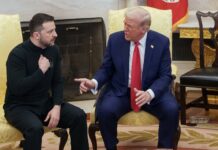World leaders from G7 nations gathered in Italy last week for the annual G7 summit. This summit comes right in the aftermath of European elections which saw right-wing parties increasing their power within the European Parliament. The summit also comes on the heels of two big elections in Europe in the United Kingdom and France, after surprise elections had been called in both countries. Then there is the presidential election in November in the United States coming up with the prospect of Donald Trump returning to the presidency in a few months time. Likewise, elections are expected to be held in Japan this year as well.
With the prospect of the upcoming elections among G7 nations, it is difficult to predict whether the respective governments will follow through on any of the policy agenda pushed by G7 nations. Moreover, perhaps aside from Italy’s Giorgia Meloni, the heads of state represented in the G7 meeting are incredibly unpopular among their electorates in their countries. Therefore, it is safe to assume that there likely will be significant changes in the leadership of G7 nations around the next time the annual summit arrives.
However, despite the political anxiety felt by many of the G7 leaders, they pushed through with their agenda for this meeting. High on the agenda for G7 leaders, as has been the case for the last few years following Russia’s invasion of Ukraine, has been showcasing their support for Ukraine. G7 leaders announced a 50 billion dollar loan they will be giving Ukraine, with the use of funds from Russian assets that Western nations have frozen, after they had imposed sanctions on Russia following its full-scale invasion of Ukraine.
In response to the news about the loan being handed to Ukraine, Russia’s President Vladimir Putin denounced the agreement as “theft.” The use of frozen Russian assets to aid Ukraine has been a topic of discussion for years, at this point, as Western nations have sought different innovative ways they can provide military support for Ukraine. There had long been fears of the market consequences of upending international norms by using the frozen assets of one nation against them.
However, Western nations claim that they seem to have discovered some kind of legal framework in which they are confident. So much so, the United States treasury secretary, Janet Yellen, recently went on the record saying that the loan is “definitely legal” according to Politico. In a sharp rebuke of the action by Western nations, Putin stated that “despite all the trickery, theft is still theft and will not go unpunished” according to Al Jazeera.
Putin went on to say that the treatment Russia has so far received was proof that “anyone” could be next and punished by the freezing of assets. However, Jennet Yellen dismissed such claims, saying “There’s no legal issue here,” according to Politico.
“Despite all the trickery, theft is still theft and will not go unpunished”
Vladimir Putin on loan given to Ukraine from frozen Russian assets
Moreover, G7 nations made a sharp rebuke of China, accusing them of enabling Russia’s invasion of Ukraine. In a statement released by G7 leaders, they stated, “China’s ongoing support for Russia’s defence industrial base is enabling Russia to maintain its illegal war in Ukraine and has significant and broad-based security implications.” They made the call on China to stop the transfer of “dual-use materials” that could be used as weapons by Russia in its war against Ukraine.
It was during the G7 summit, for the first time, we heard a clear message from Vladimir Putin on his requirements for a cessation of the war. In his proposed plan for a ceasefire, Putin stated that before a ceasefire to be reached, Ukrainian forces would be required to withdraw from the Ukrainian territories of Donetsk, Luhansk, Kherson and Zaporizhzhia, which Russia claims to have annexed, according to the BBC. The irony pointed out by some analysts of the terms is that some areas Russia claims to have annexed are still under the control of Ukrainian forces.
The terms laid out by the Russian President had been almost immediately rejected by Ukrainian officials. Ukrainian President, Volodymyr Zelenskyy, even went as far as to call the ceasefire terms as “Hitler-like,” according to the BBC. The rejection of ceasefire terms which would include Ukraine giving up such significant swaths of its territory was always likely to be expected. Honestly, it would have been more strange if the Ukrainian President had accepted the terms laid out by Vladimir Putin.
The reality is that Ukraine’s president will likely never accept any kind of ceasefire agreement brought forth by the Russians. The level of animosity between both sides is too much to overcome. Exemplified by the fact that both sides have on multiple occasions referred to each other as nazis.
Any kind of ceasefire would therefore have to be imposed on Ukraine by its allies. Once Western nations decide that they will no longer support Ukraine in its defence is the day that the war ends. And as for now, Western nations have continued to express their continued support for Ukraine. Italy’s prime minister dismissed Putin’s peace plan as “propaganda,” likewise the German Chancellor, Olaf Scholz described the plan outlined by Putin as “dictatorial peace,” according to the BBC.
The fact is that Ukraine would be completely unable to defend itself against Russia without Western support. We saw the significant gains that Russia managed to make against Ukraine during the months when aid from the United States had been stalled by Republicans in the US House of Representatives.
Though Western nations for now are behind Ukraine, with the bevvy of elections that are coming up in many of the G7 nations, it remains to be seen if that support will continue. Especially if Donald Trump is to be re-elected President, it is unclear whether he would continue America’s efforts in providing support to Ukraine.
It’s also a possibility that Western aid simply is not enough for Ukraine to continue its fight. Russia has become deeply entrenched in Ukrainian territory that it has control over. Ukraine is suffering from a shortage of manpower, as many of its soldiers have died or been wounded in combat. Ukraine’s government has sought to increase its military capacity recently by reducing its conscription age and conscripting Ukrainian men living abroad. However, the manpower advantage Russia has over Ukraine has proven to be a major problem for Ukraine.

Likewise, much of Ukraine’s vital national infrastructure has been destroyed by Russian shelling. Infrastructure such as electricity plants and water treatment facilities have been badly damaged, and are regularly the target of attacks. The damage to Ukraine’s infrastructure has had catastrophic effects on Ukraine’s economy and its ability to carry out the war.
It’s very much a possibility that Ukraine is simply not able to fight off Russia and eventually falls. Russia has shown that it has no issue in fighting a long-drawn-out war so far. Moreover, their economy has managed to maintain itself despite being sanctioned and isolated by Western nations.
Most Western nations have made it clear that they would not be willing to send troops to fight in Ukraine. The only help they are willing to provide Ukraine has been in the form of military assistance, however, it is very likely that may simply not be sufficient. Although Putin’s ceasefire proposal has been widely rejected and condemned, in the end that may be Ukraine’s best opportunity for peace.











